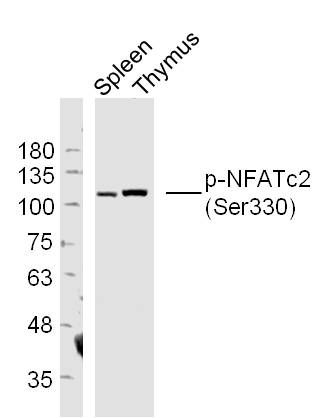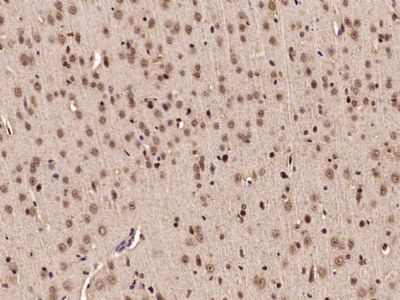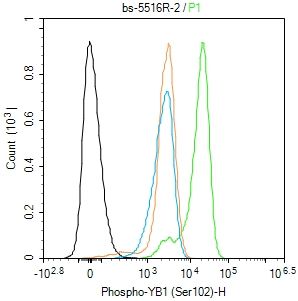上海细胞库
人源细胞系| 稳转细胞系| 基因敲除株| 基因点突变细胞株| 基因过表达细胞株| 重组细胞系| 猪的细胞系| 马细胞系| 兔的细胞系| 犬的细胞系| 山羊的细胞系| 鱼的细胞系| 猴的细胞系| 仓鼠的细胞系| 狗的细胞系| 牛的细胞| 大鼠细胞系| 小鼠细胞系| 其他细胞系|

| 规格 | 价格 | 库存 |
|---|---|---|
| 50ul | ¥ 1200 | 8 |
| 100ul | ¥ 1900 | 8 |
| 200ul | ¥ 2900 | 6 |
| 英文名称 | phospho-NFATc2 (Ser330) |
| 中文名称 | 磷酸化核因子活化T细胞胞浆蛋白2抗体 |
| 别 名 | NFATC2(phospho Ser330); NFATC2(phospho S330); AI607462; KIAA0611; NF ATp; NF-ATc2; NFAT 1; NFAT pre existing subunit; NFAT transcription complex, preexisting component; NFAT1; NFAT1-D; NFATc2; NFATp; Nuclear factor of activated T cells cytoplasmic 2; Nuclear factor of activated T cells cytoplasmic calcineurin dependent 2; Nuclear factor of activated T cells pre-existing component; T cell transcription factor NFAT; NF2IP_HUMAN; Nuclear factor of activated T-cells, cytoplasmic 2; NFAT pre-existing subunit; NF-ATp; T-cell transcription factor NFAT1. |
| 产品类型 | 磷酸化抗体 |
| 研究领域 | 免疫学 神经生物学 信号转导 转录调节因子 激酶和磷酸酶 t-淋巴细胞 |
| 抗体来源 | Rabbit |
| 克隆类型 | Polyclonal |
| 交叉反应 | Human, Mouse, Rat, (predicted: Dog, Pig, Cow, Horse, ) |
| 产品应用 | WB=1:500-2000 ELISA=1:5000-10000 IHC-P=1:100-500 Flow-Cyt=1ug/Test (石蜡切片需做抗原修复) not yet tested in other applications. optimal dilutions/concentrations should be determined by the end user. |
| 理论分子量 | 100kDa |
| 细胞定位 | 细胞核 细胞浆 |
| 性 状 | Liquid |
| 浓 度 | 1mg/ml |
| 免 疫 原 | KLH conjugated Synthesised phosphopeptide derived from human NFATc2 around the phosphorylation site of Ser330: DP(p-S)PV |
| 亚 型 | IgG |
| 纯化方法 | affinity purified by Protein A |
| 缓 冲 液 | 0.01M TBS(pH7.4) with 1% BSA, 0.03% Proclin300 and 50% Glycerol. |
| 保存条件 | Shipped at 4℃. Store at -20 °C for one year. Avoid repeated freeze/thaw cycles. |
| 注意事项 | This product as supplied is intended for research use only, not for use in human, therapeutic or diagnostic applications. |
| PubMed | PubMed |
| 产品介绍 | This gene is a member of the nuclear factor of activated T cells (NFAT) family. The product of this gene is a DNA-binding protein with a REL-homology region (RHR) and an NFAT-homology region (NHR). This protein is present in the cytosol and only translocates to the nucleus upon T cell receptor (TCR) stimulation, where it becomes a member of the nuclear factors of activated T cells transcription complex. This complex plays a central role in inducing gene transcription during the immune response. Alternate transcriptional splice variants encoding different isoforms have been characterized. [provided by RefSeq, Apr 2012] Function: Plays a role in the inducible expression of cytokine genes in T-cells, especially in the induction of the IL-2, IL-3, IL-4, TNF-alpha or GM-CSF. Promotes invasive migration through the activation of GPC6 expression and WNT5A signaling pathway. Subunit: Member of the multicomponent NFATC transcription complex that consists of at least two components, a pre-existing cytoplasmic component NFATC2 and an inducible nuclear component NFATC1. Other members such as NFATC4, NFATC3 or members of the activating protein-1 family, MAF, GATA4 and Cbp/p300 can also bind the complex. The phosphorylated form specifically interacts with XPO1; which mediates nuclear export. NFATC proteins bind to DNA as monomers. Interacts with NFATC2IP (By similarity). Subcellular Location: Cytoplasm. Nucleus. Note=Cytoplasmic for the phosphorylated form and nuclear after activation that is controlled by calcineurin-mediated dephosphorylation. Rapid nuclear exit of NFATC is thought to be one mechanism by which cells distinguish between sustained and transient calcium signals. The subcellular localization of NFATC plays a key role in the regulation of gene transcription. Tissue Specificity: Expressed in thymus, spleen, heart, testis, brain, placenta, muscle and pancreas. Post-translational modifications: In resting cells, phosphorylated by NFATC-kinase on at least 18 sites in the 99-365 region. Upon cell stimulation, all these sites except Ser-245 are dephosphorylated by calcineurin. Dephosphorylation induces a conformational change that simultaneously exposes an NLS and masks an NES, which results in nuclear localization. Simultaneously, one site among Ser-53; Ser-54 and Ser-56 is phosphorylated; which is required for full transcriptional activity. Similarity: Contains 1 RHD (Rel-like) domain. SWISS: Q13469 Gene ID: 4773 |
| 产品图片 |  Sample: Spleen (Mouse) Lysate at 40 ug Thymus (Mouse) Lysate at 40 ug Primary: Anti- p-NFATc2(Ser330) (bs-5516R)at 1/300 dilution Secondary: IRDye800CW Goat Anti-Rabbit IgG at 1/20000 dilution Predicted band size: 100kD Observed band size: 110 kD  Sample: Raji Cell (Human) Lysate at 30 ug Primary: Anti- p-NFATc2(Ser330) (bs-5516R)at 1/300 dilution Secondary: IRDye800CW Goat Anti-Rabbit IgG at 1/20000 dilution Predicted band size: 100kD Observed band size: 110 kD  Paraformaldehyde-fixed, paraffin embedded (Rat brain); Antigen retrieval by microwave in sodium citrate buffer (pH6.0) ; Block endogenous peroxidase by 3% hydrogen peroxide for 30 minutes; Blocking buffer (3% BSA) at RT for 30min; Antibody incubation with (phospho-NFATc2(Ser330)) Polyclonal Antibody, Unconjugated (bs-5516R) at 1:400 overnight at 4°C, followed by conjugation to the secondary antibody (labeled with HRP)and DAB staining.  Blank control(black line):Molt4. Primary Antibody (green line): Rabbit Anti-phospho-NFATc2 (Ser330) antibody (bs-5516R) Dilution:1ug/Test; Secondary Antibody(white blue line): Goat anti-rabbit IgG-AF488 Dilution: 0.5ug/Test. Isotype control(orange line): Normal Rabbit IgG Protocol The cells were fixed with 4% PFA (10min at room temperature)and then permeabilized with 90% ice-cold methanol for 20 min at -20℃, The cells were then incubated in 5%BSA to block non-specific protein-protein interactions for 30 min at room temperature .Cells stained with Primary Antibody for 30 min at room temperature. The secondary antibody used for 40 min at room temperature. Acquisition of 20,000 events was performed. |